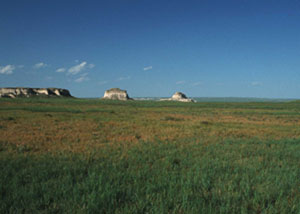
Range Science is a major offered as a four-year bachelor of science degree in the School of Natural Resource Sciences. Range Science deals with the interrelationships among biotic (plants, animals, etc) and abiotic (soils, climate, etc.) factors and the use of these factors in management of rangeland ecosystems.
Range Science is a unique program that blends science and management for the purpose of sustaining rangelands. Rangelands are important for a diverse array of products and services they provide. Rangelands are important for ranching, wildlife, water, and recreation to name a few. Rangelands comprise over 40% of the Earth’s land and include grasslands, prairies, savannahs, shrublands, deserts, meadows, marshes, wetlands, alpine, arctic, and some types of forests. Rangelands are comprised mainly of native grasses, forbs, and shrubs which are extremely productive and rich in biodiversity.

Range Science provides students with the knowledge and experience to manage rangeland resources for the highest continuing yield of products consistent with the conservation of the natural renewable resources. Students are introduced to a broad array of plant, soil, and animal sciences. The undergraduate program is designed to provide adequate training in range plants and ecology, range improvement and management, rangeland monitoring techniques, and watershed management. Basic knowledge of other sciences such as biology, botany, chemistry, mathematics, and zoology is required. Courses in related fields of animal science, entomology, forestry, geology, GIS, natural resource management, soils, and wildlife management are included.
Just as rangelands are diverse, so too are the careers available in rangeland management. Professional career options for rangeland managers are in private and public land management, scientists, educators, ranching, wildlife and fisheries, hydrology, economics. The majority of graduates in Range Science find employment with federal and state agencies as range conservationists in the USDA Forest Service, Natural Resources Conservation Service, Bureau of Land Management, U.S Fish and Wildlife Service, Bureau of Indian Affairs, National Park Service, State Land Department, State Health Department, Universities, and others. Career tracks in agribusiness and non-profit organizations are also possible.
Students in the Range Science program will take courses in animal sciences, biology, botany, chemistry, economics, natural resources management, plant sciences, soil science, statistics, zoology, as well as the requirements for general education.
High school preparation should include course work in biology, chemistry, math, and English.